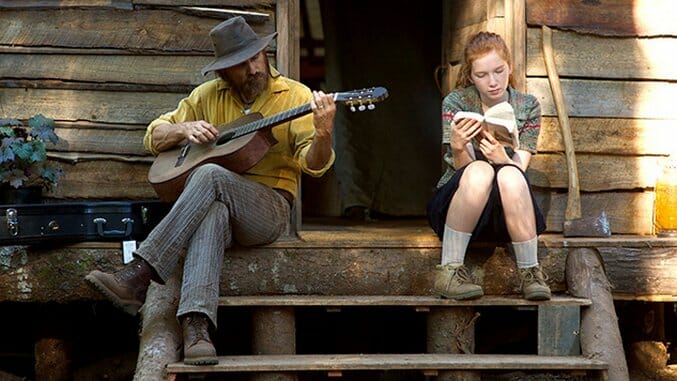Captain Fantastic

Viggo Mortensen flexes his dad muscles once again in Captain Fantastic, this time as rogue philosopher and father of six, Ben Cash, a man tired of contributing to a corrupt system where politicians are puppets for interest groups and moral values are traded for stock options. So when Hillary tightens her stranglehold on the media and buries Bernie under superdelegates, Ben thinks to himself, “Time to stick it to the man.” Realizing that America might never wake up, he and his wife Leslie (Trinn Miller) pack the kids onto their VW bus and move to the forests of the Pacific Northwest. There they’ll live off the land and emancipate themselves from mental slavery. A man who has his family has all the riches in the world, you see.
It’s here. Bernie Bro: The Movie is here.
All right, so it isn’t #BernieOrBust that makes Ben and Leslie decide to live as forest people—they do it for the more abstract purpose of protecting their kids from the ills of modern society. And they don’t take a VW, they take a school bus. But barring a few particulars, Captain Fantastic is the incarnation of a Bernie base consciousness. When Ben’s sister (Kathryn Hahn) urges him to put the kids in a “normal school,” he has his 9-year-old daughter demonstrate her civic knowledge by babysplaining the Citizens United v FEC decision). The kids’ names are Bodevan, Kielyr, Vespyr, Rellian, Zaja and Nai, obviously. The school bus’s name is Steve. Shepard Fairey even designed the promotional Father’s Day poster.
And, like the Brothers Bern, Captain Fantastic winds up falling to bullheaded egoism. Despite mounting wrong turns, it marches forward without evolving its message or its characters. Great performances, especially from Mortensen and George MacKay as eldest son Bo, keep it afloat for well into the second act—until capsizing from a blistering acoustic cover of “Sweet Child O’ Mine” by the Cash family band, aka Dr. Viggo’s 100% Natural Good-Time Swiss Family Robinson Solution.
-

-

-

-

-

-

-

-

-

-

-

-

-

-

-

-

-

-

-

-

-

-

-

-

-

-

-

-

-

-

-

-

-

-

-

-

-

-

-

-








































